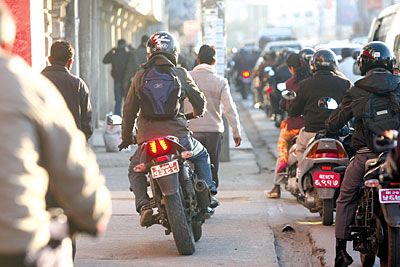 KIRAN PANDAY |
It was an ordinary day in an outer city Kathmandu neighbourhood. I'd paused by the side of a steep, gravelly incline when the rattle of a motorbike alerted me to a youth straining up behind me, too close for comfort. He swerved and passed me, two children hanging onto the back seat, but the machine couldn't make the grade, and he slid backwards and toppled over in slow motion.
Any other day this might have been quite amusing. But we started arguing.
'Why didn't you give way?
"Why didn't you use your horn? Why didn't you pass me on the right?"
"Don't you see you were in the way? How could I pass you?"
It was true, I was standing on the smoother, more navigable part of the road. But I certainly wasn't going to concede the point to someone half my age who was now swearing at me, demanding I apologise or he'd fix me.
I should have taken him at his word when he flicked out his phone, ranting all the while. As a passing local tried to mollify him, I slowly walked away. It was too late. Once more, I heard the bike roar up behind me, and before I knew it, two of his friends had joined him and began to kick and punch me. Luckily, a few more locals managed to pull me away and push me up the slope, away from the raging youths.
It was a shock. Never mind my own anger. What struck me was how easily violence came to these kids, and how easily one could be caught up in it.
Perhaps I shouldn't have been. God knows I've seen and heard of enough senseless, unnecessary violence in this country, from drunken scuffles among friends to the burning of buses involved in accidents, to yes, the civil conflict that claimed the lives of 13,000 Nepalis.
But the incident did make me wonder?- do Nepalis have an instinct for violence (cultivated assiduously through the mythic figure of the mercenary Gurkha) that is beginning to override the equally mythic, peace-loving, ever-smiling Nepali? The late king Birendra, of course, bore the brunt of this impossible contradiction?- he pushed for the declaration of Nepal as a Zone of Peace, only to perish in a hail of gunfire in his own home, at the hands of his own son.
There is a general sense that criminality and violence is on the rise in Nepal. Some would lay the blame at the feet of a state unable to provide security and deter crime in a society still plagued by poverty. But could it reflect a fundamental change in the Nepali character, if it is at all possible to generalise? Is it true that if we are not necessarily more likely to murder than we were two decades ago, we are at least much more likely to 'fix' each other at the drop of a hat?
If this is indeed the case, if Nepalis have become more violent as a society, it is not so difficult to attribute causes.
The conflict is the 800-pound gorilla in the room. A whole generation of Nepali youth has grown up thinking violence is an acceptable means to whatever end, thanks to the example and encouragement of elder statesmen across the political spectrum.
Migration, too, has precipitated a breakdown in traditional notions of family and community, and urbanisation brings many more strangers into uncomfortable proximity. You're far more likely to punch a stranger who grazes your car in midtown traffic than your uncle in downtown Raigaun whose cycle has just knocked into your cow.
Certainly we're misguided if we imagine foreigners think we are all happy-go-lucky smilers welcoming them to their beautiful land. Every single time I've had a visitor from abroad, some stupid Nepali has contrived to destroy that illusion?- the taxi drivers who refused to let our hired Russian jeep pass from Naya Pul to Pokhara because it was 'their route'; the guides in Bhaktapur who called me a 'hero' because I told them none of my friends needed their services; and last week, a Thai friend had to intervene to stop a fight between children wielding rocks.
There used to be a time when we studied etiquette in school. In the gnarly, uncouth polity in which Nepalis are barely managing to co-exist at present, such a conceit seems laughable. But perhaps it's time we took a good, long, hard look at ourselves, and consider if our ready anger is really worth the consequences.



